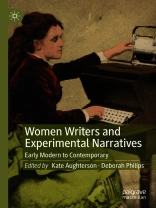This book explores the history of women’s engagement with writing experimentally. Women writers have long used different narratives and modes of writing as a way of critiquing worlds and stories that they find themselves at odds with, but at the same time, as a way to participate in such spaces. Experimentation—of style, mode, voice, genre and language—has enabled women writers to be simultaneously creative and critical, engaged in and yet apart from stories and cultures that have so often seen them as ‘other’. This collection shows that women writers in English over the past 400 years have challenged those ideas not only through explicit polemic and alternative representations but through disrupting the very modes of representation and story itself.
Table of Content
1. Introduction.- 2. ‘Unlink the Chain’: Experiment in Aphra Behn’s Novels.- 3. Experiment in Prose: Authority and Experience in Lady Mary Wortley Montagu’s Letters.- 4. Experiments, Experimentalists, Experimentation: Dissecting Frankenstein.- 5. Genre-Bending and Experimentation in Sensation Fiction; The Case of Mary Braddon and Ellen Wood.- 6. The Ironic Strategies of Kate Chopin’s The Awakening.- 7. Realms of Resemblance: Virginia Woolf, Simone de Beauvoir and Maï Zetterling.- 8. Neo-Victorian Experimental Narrative: Writing the Absent Objects of History in Affinity and In the Red Kitchen.- 9. 1966 and Wide Sargasso Sea: The Climate that Made Jean Rhys Legible.- 10. Troublesome reading: story and speculation in African American and African originated women’s writing. Resurrecting the past, re-imagining the future.- 11. ‘She’s a Fine Girl’: An Autotheoretical Examination of Early Experiences of Sexuality and Selfhood in Eimear Mc Bride’s A Girl is a Half-Formed Thing and Charlotte Roche’s Wetlands.- 12. Helen Oyeyemi at the Vanguard of Innovation in Contemporary Black British Women’s Literature.- 13. ‘Daring to tilt worlds’: the fiction of Irenosen Okojie.- 14. Working from the Wound: Trauma, memory and experimental writing praxis in Jeanette Winterson’s Why Be Happy When You Could Be Normal?.
About the author
Kate Aughterson is Principal Lecturer in English Literature at the University of Brighton, UK, specializing in women’s writing and early modern drama. Her books include Renaissance Woman (1995), Webster: The Tragedies (2001), Aphra Behn: The Comedies (2003), Shakespeare: The Late Plays (2013) and she is co-author of Jim Crace: Into the Wilderness (2018) and Shakespeare and Gender (2020).
Deborah Philips is Professor of Literature and Cultural History at the University of Brighton, UK. Her books include:
Writing Romance: Women’s Fiction 1945–
present (2006),
Fairground Attractions (2012),
The Trojan
Horse (with Garry Whannel, 2015) and
Brave New Causes (with Ian Haywood, 1999). Her study of Sandy Wilson,
And this is My Friend Sandy, will be published in 2020.












